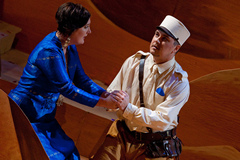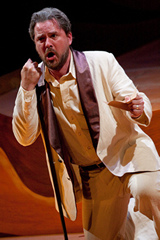| Opera Reviews | 23 April 2024 |
| Pinchgut's
finest achievement yet by Sarah Noble |
|
| Cavalli: L'Ormindo Pinchgut Opera City Recital Hall, Sydney 2 December 2009 |
|
|
Talya Masel's bubbly production celebrates the opera's improbabilities with a stylish sense of fun. The Morocco of her L'Ormindo is timeless and fantastical: a world, as Masel puts it in her program note, "in which anything is possible". Adam Gardnir's sets (astutely lit by Bernie Tan-Hayes) give us Fez à la Hanna Barbera, a curving, cartoonish landscape of sand dunes and stars. His costumes are a similarly adorable hodge-podge, ranging from Arabian Nights to Casablanca. It's a sprightly, well-paced show, elastic enough to keep up the quickfire pace of the first two acts while allowing the long set pieces of Act Three room to breathe. (Credit for this success, it should be noted, is due not only to Masel's exuberant vision, but to the skill of Mark Gaal and Sean Hall, who stepped in to finish rehearsals after personal reasons forced Masel to return to Melbourne two weeks before opening night.) Fiona Campbell (Erisbe, Queen of Morocco and Fez) is an alluring and
curiously loveable adultress, the flexibility and idiomatic ease of her
singing underpinned by radiant, individualised tone. She's a convincing
actor both vocally and physically, bringing sincerity both to Erisbe's
desperation and to her amorous entanglements. Countertenor David Walker
(Ormindo) is rather reserved for an impetuous lover, but the dry wit of
his characterisation has a certain appeal just the same. His voice takes
a little time to hit its stride but ultimately blooms quite beautifully,
and its sweetness is well matched to Campbell's earthier sound. As the
conflicted Amida, Tenor Trevor Pichanick overcomes a slightly strained
beginning to show a promising increase in confidence and tonal variety,
although he's less convincing dramatically. |
|
|
As the old King, Ariadeno (Erisbe's cuckolded husband), bass Richard Anderson makes much of a somewhat limited role, heightening the opera's moral ambivalence with a characterisation which belies some of his wife's sharp mockery. Amidst an array of high voices, it's welcome relief to be taken into the bass clef for a little while, and Anderson's solid, sturdy sound does that job nicely. The absence of a chorus from Cavalli's score has left regular Pinchgut collaborators Cantillation out of a job; three of its members, however, make strong impressions in supporting roles. Soprano Jane Sheldon is a gamine Nerillo (Amida's page), while Andrei Laptev displays an extraordinarily expressive tenor as the page Osmano. Soprano Anna Fraser scores one of the show's most notable successes as both Melide (Sicle's lady-in-waiting) and Mirinda (Erisbe's companion). Fraser's singing is charming throughout, but her real star turn is in the latter role, wandering among the orchestra to deliver a virtuosic and very funny tirade against "foolish old men". Directing from the harpsichord, conductor Erin Helyard maintains excellent balance between the comic brilliance and the genuine pathos of Cavalli's mercurial score. Helyard's energised and mobile leadership draws an astonishing variety of colour from a reduced incarnation of Pinchgut's regular band, the Orchestra of the Antipodes. Their performance is taut, precise and frequently enchanting, replete with the exoticism this Venice-meets-Fez extravaganza demands. Sydney affords few better examples of the depth of artistic talent on
offer in this country than Pinchgut. Combining as it does the lucid leadership
of both Helyard and Masel with a first-rate cast and an especially felicitous
repertoire choice, this irresistible L'Ormindo might just be the
company's finest achievement yet. |
|
| Text ©
Sarah Noble Photos © Simon Hodgson Photography |

 After
a series of rather serious military operas it's both a relief and a delight
this year to see Pinchgut Opera turn its hand once again to comedy, with
Francesco Cavalli's riotously amoral L'Ormindo. Like Monteverdi's
L'incoronazione di Poppea before it, L'Ormindo was written
for performance during Venice's Carnival season, a time of famously extravagant
and frequently scandalous festivities. L'Ormindo is a much lighter
and more optimistic piece than Poppea, but its moral code is roughly
equivalent: infidelity abounds, partners are swapped with gay abandon,
and punishment is thin on the ground.
After
a series of rather serious military operas it's both a relief and a delight
this year to see Pinchgut Opera turn its hand once again to comedy, with
Francesco Cavalli's riotously amoral L'Ormindo. Like Monteverdi's
L'incoronazione di Poppea before it, L'Ormindo was written
for performance during Venice's Carnival season, a time of famously extravagant
and frequently scandalous festivities. L'Ormindo is a much lighter
and more optimistic piece than Poppea, but its moral code is roughly
equivalent: infidelity abounds, partners are swapped with gay abandon,
and punishment is thin on the ground.  Taryn
Fiebig's girlish Sicle is a perfect contrast to Campbell's sophisticated
Erisbe. Fiebig has lately been thrust by Opera Australia into a huge variety
of repertoire, but with Cavalli she is truly on home territory, singing
with precision, perceptiveness and ravishing beauty of tone. Her acting
has never been better: the joyous energy of her performance is utterly
infectious. Tenor Kanen Breen's gift for grotesque flamboyance is put
to outrageously hilarious use as Erice, Sicle's cackling nurse, a female
role written for a male voice. He squirms and dances up a lascivious storm,
while twisting his characterful, if less than beautiful voice to the role's
every vulgar purpose. His acrobatic rendition of Erice's paean to promiscuity
("Verginella infelice") is a show-stopper.
Taryn
Fiebig's girlish Sicle is a perfect contrast to Campbell's sophisticated
Erisbe. Fiebig has lately been thrust by Opera Australia into a huge variety
of repertoire, but with Cavalli she is truly on home territory, singing
with precision, perceptiveness and ravishing beauty of tone. Her acting
has never been better: the joyous energy of her performance is utterly
infectious. Tenor Kanen Breen's gift for grotesque flamboyance is put
to outrageously hilarious use as Erice, Sicle's cackling nurse, a female
role written for a male voice. He squirms and dances up a lascivious storm,
while twisting his characterful, if less than beautiful voice to the role's
every vulgar purpose. His acrobatic rendition of Erice's paean to promiscuity
("Verginella infelice") is a show-stopper. 





